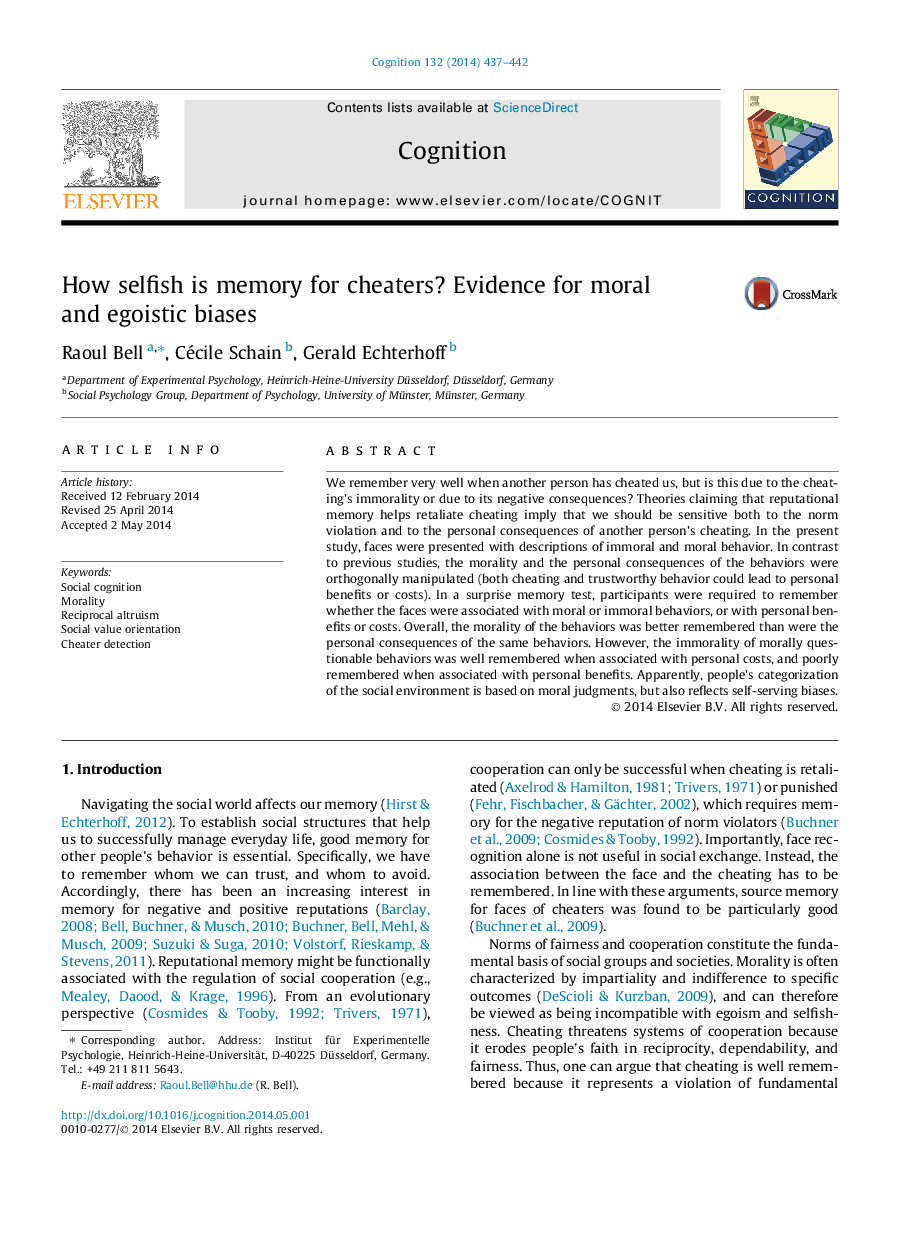| کد مقاله | کد نشریه | سال انتشار | مقاله انگلیسی | نسخه تمام متن |
|---|---|---|---|---|
| 10457539 | 921842 | 2014 | 6 صفحه PDF | دانلود رایگان |
عنوان انگلیسی مقاله ISI
How selfish is memory for cheaters? Evidence for moral and egoistic biases
ترجمه فارسی عنوان
چقدر خودخواهانه برای تقلبها حافظه است؟ شواهدی برای تعصبات اخلاقی و خودخواهانه
دانلود مقاله + سفارش ترجمه
دانلود مقاله ISI انگلیسی
رایگان برای ایرانیان
کلمات کلیدی
ترجمه چکیده
ما خیلی خوب به یاد می آوریم که فرد دیگری ما را فریب داده است، اما آیا این به خاطر ابهام تقلب یا به خاطر پیامدهای منفی آن است؟ نظریه های ادعا می کنند که حافظه مجازی به مقابله با مجازات کمک می کند، به این معنی است که ما باید به نقض عرف و عواقب شخصی تقلب در شخص حساس باشیم. در این مطالعه، چهره ها با توصیف رفتار غیر اخلاقی و اخلاقی ارائه شده است. بر خلاف مطالعات قبلی، اخلاق و پیامدهای شخصی رفتارها به طور مرتب با هم برخورد کردند (هر دو تقلب و رفتار قابل اعتماد می تواند منجر به مزایای شخصی یا هزینه های شخصی شود). در آزمون حافظه جای تعجب، شرکت کنندگان مجبور بودند به یاد بیاورند که آیا چهره ها با رفتار اخلاقی یا غیر اخلاقی همراه بوده یا با مزایای شخصی یا هزینه های شخصی. به طور کلی، اخلاق رفتارها بهتر یاد می شود از عواقب شخصی رفتارهای مشابه. با این حال، تخریب رفتارهای مشکوک اخلاقی با توجه به هزینه های شخصی به خوبی به یاد می آید و وقتی که با مزایای شخصی همراه است، به یاد می آید. ظاهرا طبقه بندی افراد از محیط اجتماعی مبتنی بر احکام اخلاقی است، اما منعکس کننده تعصبات خودخواهانه است.
موضوعات مرتبط
علوم زیستی و بیوفناوری
علم عصب شناسی
علوم اعصاب شناختی
چکیده انگلیسی
We remember very well when another person has cheated us, but is this due to the cheating's immorality or due to its negative consequences? Theories claiming that reputational memory helps retaliate cheating imply that we should be sensitive both to the norm violation and to the personal consequences of another person's cheating. In the present study, faces were presented with descriptions of immoral and moral behavior. In contrast to previous studies, the morality and the personal consequences of the behaviors were orthogonally manipulated (both cheating and trustworthy behavior could lead to personal benefits or costs). In a surprise memory test, participants were required to remember whether the faces were associated with moral or immoral behaviors, or with personal benefits or costs. Overall, the morality of the behaviors was better remembered than were the personal consequences of the same behaviors. However, the immorality of morally questionable behaviors was well remembered when associated with personal costs, and poorly remembered when associated with personal benefits. Apparently, people's categorization of the social environment is based on moral judgments, but also reflects self-serving biases.
ناشر
Database: Elsevier - ScienceDirect (ساینس دایرکت)
Journal: Cognition - Volume 132, Issue 3, September 2014, Pages 437-442
Journal: Cognition - Volume 132, Issue 3, September 2014, Pages 437-442
نویسندگان
Raoul Bell, Cécile Schain, Gerald Echterhoff,
